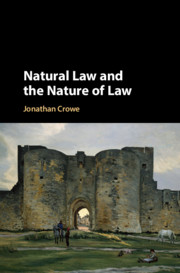(Source: CUP)
Cambridge
University Press has published a new book on natural law thinking.
ABOUT THE BOOK
This book
provides the first systematic, book-length defence of natural law ideas in
ethics, politics and jurisprudence since John Finnis's influential Natural Law
and Natural Rights. Incorporating insights from recent work in ethical, legal
and social theory, it presents a robust and original account of the natural law
tradition, challenging common perceptions of natural law as a set of timeless
standards imposed on humans from above. Natural law, Jonathan Crowe argues, is
objective and normative, but nonetheless historically extended, socially
embodied and dependent on contingent facts about human nature. It reflects the
ongoing human quest to work out how best to live flourishing lives, given the
natures we have and the social environments we inhabit. The nature and purpose
of law can only be adequately understood within this wider context of value.
Timely, wide-ranging and clearly written, this volume will appeal to those
working in law, philosophy and religious studies.
ABOUT THE AUTHOR
Jonathan
Crowe, Bond University, Queensland
Jonathan Crowe is Professor of Law at Bond University, Queensland. He is the author or editor of several books, including Legal Theory (3rd edition, forthcoming) and Research Handbook on Natural Law Theory (forthcoming). His work has appeared in leading international journals, including the Modern Law Review, the Oxford Journal of Legal Studies, Jurisprudence, Ratio Juris and Law and Critique.
TABLE OF
CONTENTS
Introduction
Part I.
Normative Foundations:
1.
Normative inclinations
2.
Theorising human goods
3. Acting
for reasons
4. The
common good
5. Rights
and freedoms
6. The role
of the state
Part II.
The Nature Law:
7. The
natural law thesis
8. Law as
an artifact kind
9. The
function of law
10. Law
without authority
11.
Contextual interpretation
12. The
value of integrity
Conclusion.
More
information here


No comments:
Post a Comment
Note: Only a member of this blog may post a comment.